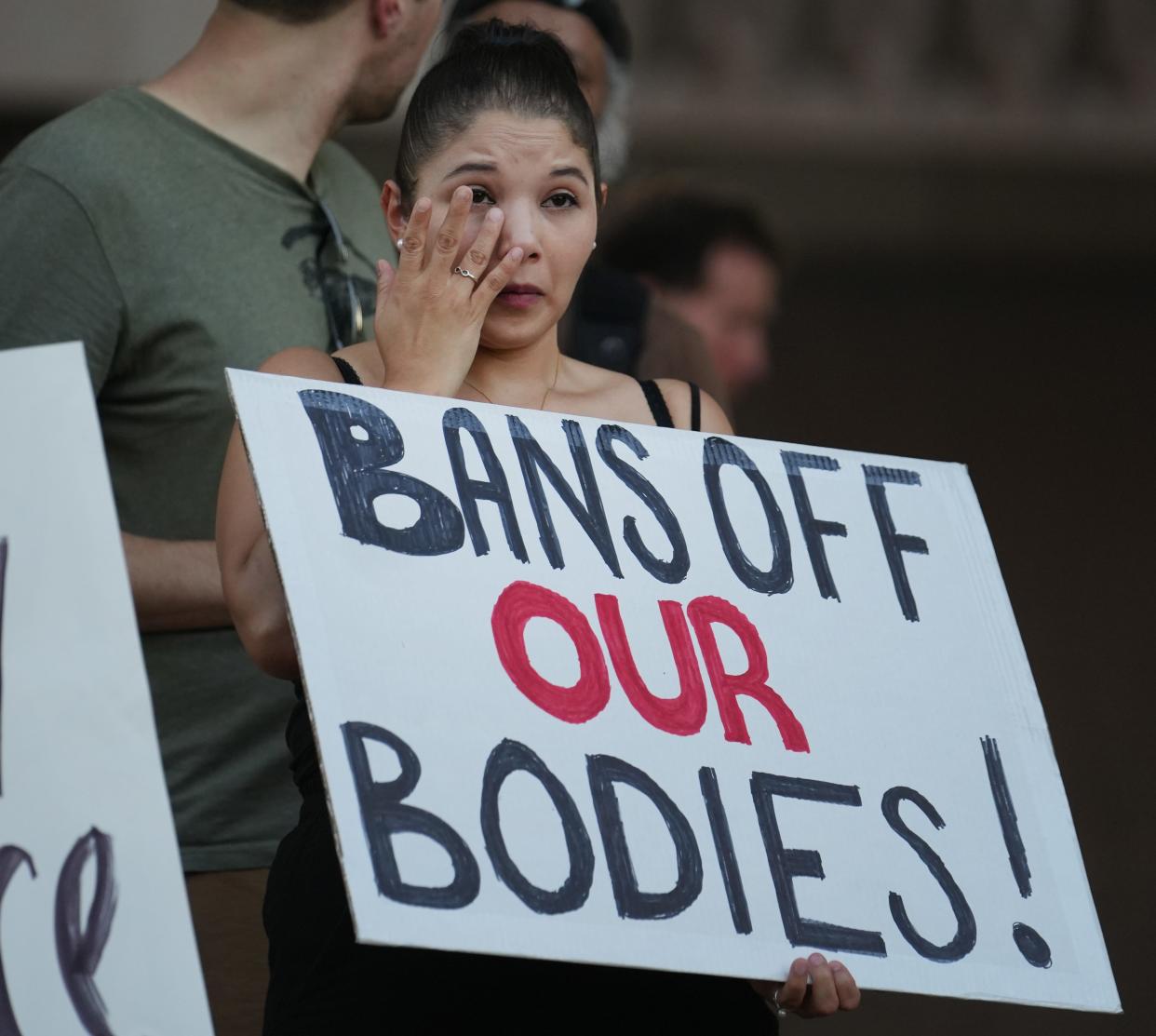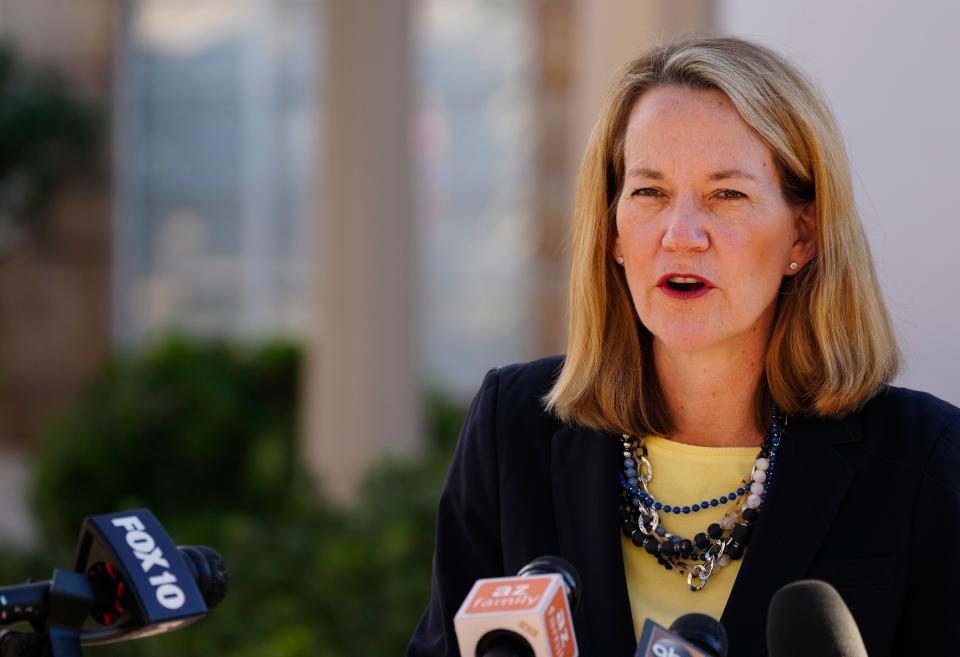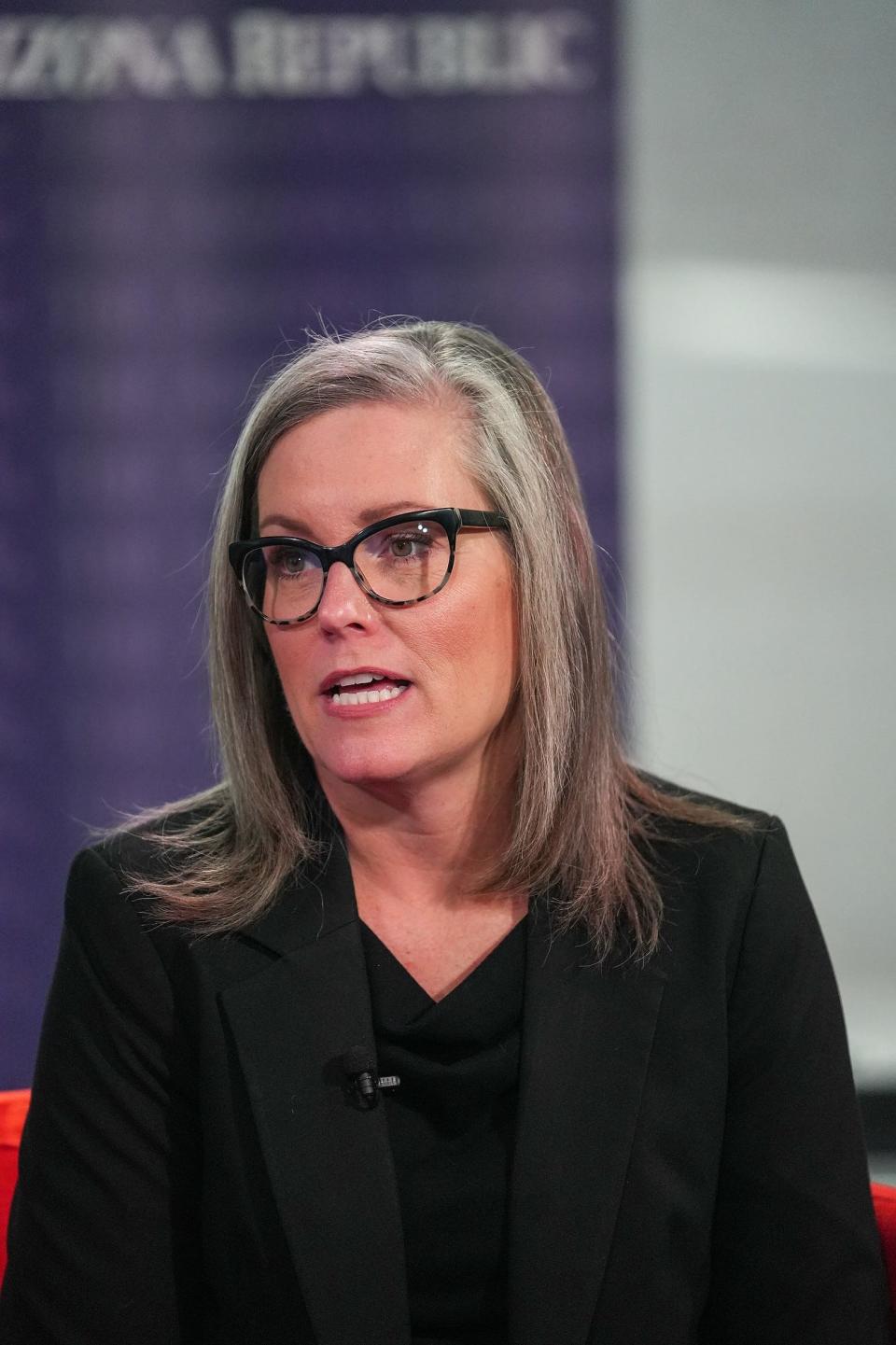Can Arizona's 1864 anti-abortion law coexist with newer statute? Judges grill attorneys

- Oops!Something went wrong.Please try again later.
Arizona appeals court judges in Tucson questioned lawyers for the state and Planned Parenthood on Wednesday about how Arizona should reckon with two overlapping anti-abortion laws passed 158 years apart.
In a lively, nearly 90-minute debate, the three-judge panel of the court's southern Arizona division challenged the lawyers on how the pre-statehood law could be made to gel with a new law limiting abortions and other statutes on the books, or if modifying its meaning would strip the Legislature of some of its power.
"Our duty is to give the words their effect, not to rewrite the legislation" or deem that part of a law is repealed, said Judge Peter Swann, a retired judge called back to active duty for the case.
The court's ruling, which may come in days or weeks, could move the state closer to bringing a Civil War-era state law back to life that mandates prison time for abortion providers. Or, as Brittany Fonteno, president and CEO of Planned Parenthood Arizona, said after the hearing, "one step closer to protecting abortion access in Arizona."
Whatever the decision, a deal between abortion rights activists and outgoing state Attorney General Mark Brnovich means the newest abortion law in Arizona will remain in place until next year. That law, signed by Gov. Doug Ducey this year, bans most abortions after 15 weeks of gestation.
The pre-statehood law was among the chief reasons Arizona's abortion facilities temporarily shut down after the U.S. Supreme Court overturned Roe v. Wade in June. Even after the deal with the state allowed facilities to reopen, providers and abortion-rights activists still worry the old law could be enforced at some point.

The issue may be a moot point past Jan. 2, to some extent, when Kris Mayes, a Democrat, is expected to take office as Arizona attorney general. Mayes has vowed not to enforce the old law and indicated Wednesday before the hearing that state support for the "draconian and unconstitutional" law would soon end.
"I will withdraw the attorney general's current support for that law when I take office," she told The Arizona Republic.
But the legal arguments on Wednesday show that confusion over the dos and don'ts of Arizona abortion law will persist without clarity from the courts.
The legal battle in Arizona began after Roe v. Wade was overturned
Brnovich, a Republican who lost his bid for U.S. Senate to Blake Masters in the August primary election, has tried to make the pre-statehood law enforceable since the U.S. Supreme Court overturned Roe v. Wade in June.
Like all states in the mid-19th century, the Arizona territory had a law that created a near-total ban on abortions. Crafted by the state's first territorial Legislature in 1864, it requires two to five years in prison for anyone helping to provide an abortion that's not necessary to save a mother's life. A companion law that mandated a year in prison for a woman who gets an abortion was repealed only last year.
The ban on providing abortions was enforced vigorously in Arizona until 1973, even as other states adopted more liberal policies, but the Roe v. Wade decision that year resulted in an injunction in Pima County Superior Court that put the law on ice for 49 years.
Anticipating that Roe v. Wade would fall, the Republican-dominated state Legislature passed the 15-week ban on party lines. The law would not have been constitutional under Roe v. Wade, which allowed abortions under state guidelines in the second trimester. But lawmakers included a provision that expressly states the new law does not repeal the 1864 law "or any other applicable state law regulating or restricting abortion."
After the U.S. Supreme Court's decision, Brnovich declared the 1864 law was now valid and went to court in Tucson to lift the injunction. Pima County Superior Court Judge Kellie Johnson ruled in September that Brnovich was correct, prompting an emergency stay of the law requested by Planned Parenthood until the appeal was heard.
Planned Parenthood Arizona wants to keep the injunction in place, arguing that state laws passed in Arizona since then that regulate abortion as a legal service must be "harmonized" with the pre-statehood law. The way to do that, according to Planned Parenthood, is through a ruling that interprets the law as applicable only when a non-physician attempts to provide an abortion.
Brnovich wants the old law to work like it did before 1973 alongside the newer and less punitive 15-week law, and with county prosecutors deciding which one would apply in each circumstance.
Judges question attorneys for Planned Parenthood, government
The three judges on the panel, Swann, Peter Eckerstrom and the court's chief judge, Garye Vasquez, spent the first half-hour grilling Planned Parenthood Federation of America lawyer Sarah MacDougall on the technical aspects of how harmonizing the laws could work.
The court shouldn't simply allow county prosecutors to decide which laws are enforceable, MacDougall said.
Before the emergency stay was granted in September, "people just simply did not know what the law was, and that is not an instance where prosecutorial discretion can be allowed to have the final say," she said.
Eckerstrom appeared sympathetic to the idea that the laws can't coexist when one makes abortions illegal at all times and another makes them legal if conducted before 15 weeks of pregnancy.
Quoting from a past court case, Eckerstrom said "the ability of law enforcement to do one thing to one person and a different thing to another person, maybe presumably based on the political affiliation of the county attorney of the county that you happen to live in" is an "evil" the courts want to avoid.
Yet the judges want to avoid a legal interpretation that results in an "implied repeal" of the 1864 law, which the 15-week law prohibits.
MacDougall acknowledged there was a "thin" line between changing a statute and carving out a whole new one from a judge's bench, after which Swann then suggested that court precedent may allow the judges to rework the statute to reconcile the old and new laws.
Samuel Brown, chief of the civil division for the Pima County Attorney's Office, told the panel that the goal should be to make the state's abortion law clear to the average person, whether the method is called harmonization or a repeal.
Eckerstrom responded, "Our legislative direction is that we can't conduct implied repeal."
"Perhaps, your Honor, if those are magic words," Brown said of the 15-week law's non-repeal provision, "if the Legislature says these two opposed acts by their language are in direct conflict but do not repeal each other, I don't believe the court should stop at those magic words."
Mike Catlett, deputy solicitor general and chief counsel of special litigation for the Attorney General's Office, told the judges the laws could work together just fine. If a doctor performed an abortion when the gestational age was 18 weeks, a prosecutor could decide whether to charge the offender under the 15-week law, which calls for felony charges and a loss of professional license, or the harsher law that requires prison time.
The judges questioned Catlett thoroughly on whether the 15-week law ever was supposed to work independently, and if enforcing the 1864 law meant the "nullification" of many of the state's abortion-related laws.
Eckerstrom said the "legislative intent" section of the new law states that its goal is to restrict abortions to 15 weeks, not ban abortion entirely — whatever else the law says. If the Legislature intended simply to replace the 15-week law with the pre-statehood law, "wouldn't you make that crystal clear as a Legislature for us?" he said.
Catlett disagreed with that analysis.
"We think all the abortion statutes can stand together," he said.
Eckerstrom noted that if the pre-statehood law goes into effect, "preposterous" consequences are possible given other abortion laws on the books. For instance, the only abortions that would be preformed legally would be to save the life of a mother, yet an Arizona law requires woman preparing to get an abortion to be shown an ultrasound picture of the fetus.
"When we got to do an abortion for the life of the mother, you better show her a picture of the sonogram so she feels good about that decision?" Eckerstrom said, his voice rising. "Right? Is that what you're suggesting?"
"That's what the law says, your Honor," Catlett replied.
Eckerstrom said that would be an "absurd result."
New leadership on way at attorney general, governor's offices

Mayes, according to her campaign website, would prefer even fewer limits than are in the 15-week law.
"As Attorney General, I will not prosecute doctors, PAs (Physician Assistants), nurses, midwives, doulas or pharmacists for providing or women for receiving reproductive services," including surgical or drug-based abortions, her site states.
The results in Mayes' race with Republican Abe Hamadeh are close enough to warrant an automatic recount that will take place after the expected state certification of the election Dec. 5.
A lawsuit that Hamadeh filed contesting the election because of polling-site problems in Maricopa County was dismissed on Tuesday by a judge who ruled that it was premature because election results were unofficial under certification.
Cathi Herrod of the powerful anti-abortion lobby group Center for Arizona Policy said Mayes' job is to "defend the constitutionality of state laws" and to do otherwise would be a dereliction of duty.
The effort to restart the pre-statehood law "will continue with or without" Mayes' support, Herrod said. "Other parties will be able to intervene."
Gov.-elect Katie Hobbs, in her victory speech, said she would "do everything in my power to repeal the draconian 1864 abortion ban that puts so many women’s lives at risk." In a subsequent interview with The Arizona Republic, she also criticized the 15-week ban as "too restrictive."
Election experts differ on the impact of abortion as a political issue on Arizona races, including the one for attorney general, although it's believed to have helped drive Democratic turnout.
Fonteno said Planned Parenthood's "doors remain open."
The organization is "committed to continuing to provide a full range of lawful sexual and reproductive health care, including abortion," she said. "We know the work is far from done, and we have said it all along — we will not stop fighting."
Reach the reporter at rstern@arizonarepublic.com or 480-276-3237. Follow him on Twitter @raystern.
Subscribe to azcentral.com today.
This article originally appeared on Arizona Republic: AZ judges, attorneys debate whether 2 anti-abortion laws can coexist

